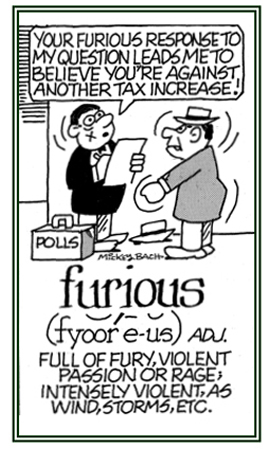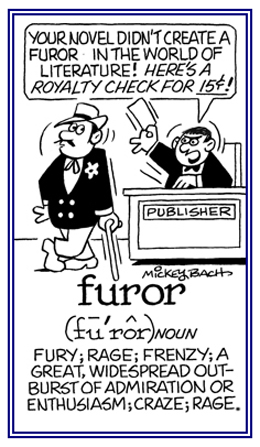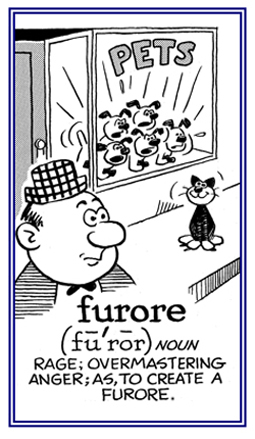fur-, furi-
(Latin: to rage, to be mad [insane with anger]; sometimes, general enthusiasm, passion)
2. Etymology: from Latin furibundus, "maniacal, mad, raging"; from furo, "rave, rage" + -bundus, "to become, to grow".

Go to this Word A Day Revisited Index
so you can see more of Mickey Bach's cartoons.
Those who were violent and maniacal were called furiosi; those exhibiting dementia, or feeble mindedness, were termed mente capti.
2. Relating to an extreme anger in action or appearance; fierce: A furious fight took place between the two dogs until one finally ran away.
3. Characteristic of a great deal of energy, violence, and speed: The car race included furious speeds which resulted in several terrible accidents.

Go to this Word A Day Revisited Index
so you can see more of Mickey Bach's cartoons.
2. A reference to behaving fiercely in action or appearance: After being lied to by her husband, Shirley furiously threw his belongings out of the window!
2. A condition, or state, of intense excitement or activity: There was a furor surrounding the release of the latest Beetle album.
3. A general commotion; public disorder or uproar: The furor on the university campus appeared to be related to the increase of tuition fees.
4. A condition or state of violent anger; rage: When teased, the injured lion went into a furor and attempted to escape.
5. A state of intense excitement or ecstasy: As Irene watched the romantic movie, her heart felt as if it were in a state of furor because it was beating so fast.
6. An angry or indignant public reaction to something: The jury verdict of not guilty created a furor in the courtroom.
7. A phase of illness in which someone behaves in an extremely active or excited way: The doctor was treating the patient for the furor brought on by her manic depressive condition.

Go to this Word A Day Revisited Index
so you can see more of Mickey Bach's cartoons.
2. An outburst of enthusiasm, or interest, followed with exaggerated zeal: The university students expressed great furore, or excitement, for several days when their football team won the championship for the first time in 15 years!

Go to this Word A Day Revisited Index
so you can see more of Mickey Bach's cartoons.
2. The condition of being wild or turbulent: The fury of the winter storm caused many trees that were overloaded with snow to fall down and to cover the roadways in the northern part of the country.
3. A state of violent mental agitation: After hearing about her daughter’s accidental death, Mary’s thoughts and feelings were all in a fury because she didn't have anyone to talk to.
4. A situation of excited or frenetic activity: The debris was scattered by the tornado's fury.
The three Furies were born from Uranus' blood
From Uranus' severed manhood (or godhood), fell countless drops of blood, which spattered all over Gaia and resulted in the existence of three hideous, winged females who were avenging deities and who pursued and punished the criminally guilty, especially murderers.
No more fearsome figures darkened the night scape of Greek mythology than those of the Erinyes. Born of the blood-drops from the emasculation (castration) of Uranus, with snakes coiled in their hair, they roamed the land avenging perjury and murder and carrying out the curses of parent against son.
Neither prayer nor tears could sway them, nor sacrifice stave off (prevent) their wrath. Often they were referred to by a euphemism meant to deprecate a visit from them, as the Eumenides, "the well-disposed".
The sisters were avengers of "bad behavior"
These Furies were agents of vengeance, pitiless, inexorable but just; horrible creatures, winged with snakes in their hair, black, their eyes dripping with blood, and with a wretchedly foul odor.
The Furies avenged a variety of crimes: murder, violation of oaths, incivility to guests, the aged, or the poor; but their most active avenging concerned crimes against relatives; especially, against parents.
The Furies would pursue their victim relentlessly with whips and torches in their hands and did not allow a person any peace until he or she was driven mad (insane).
The Furies gave English a variety of words via Latin
The Romans called these vengeful goddesses the Dirae, from dirus, source of and synonymous with the English word dire; or Furiae, from furere, "to rage".
The singular Latin form, furia, provided English with the word "fury", via the intermediate stage of French furie.
The term "rage" came into English from the same route, although here the French sound-changes made the connection to the Latin etymon "unrecognizable"; that is, the French rage goes back to Latin rabies, "frenzy, ferocity"; also the immediate source of the English modern medical term.
2. To anger, to exasperate (cause great irritation), or to annoy someone very much: There were times when Roy's stubbornness infuriated his mother.
Cross references of word families that are related directly, or indirectly, to: "anger, angry; rage, wrath, fury; rave": ira-; lysso-; mania-; rab-, rav-.
